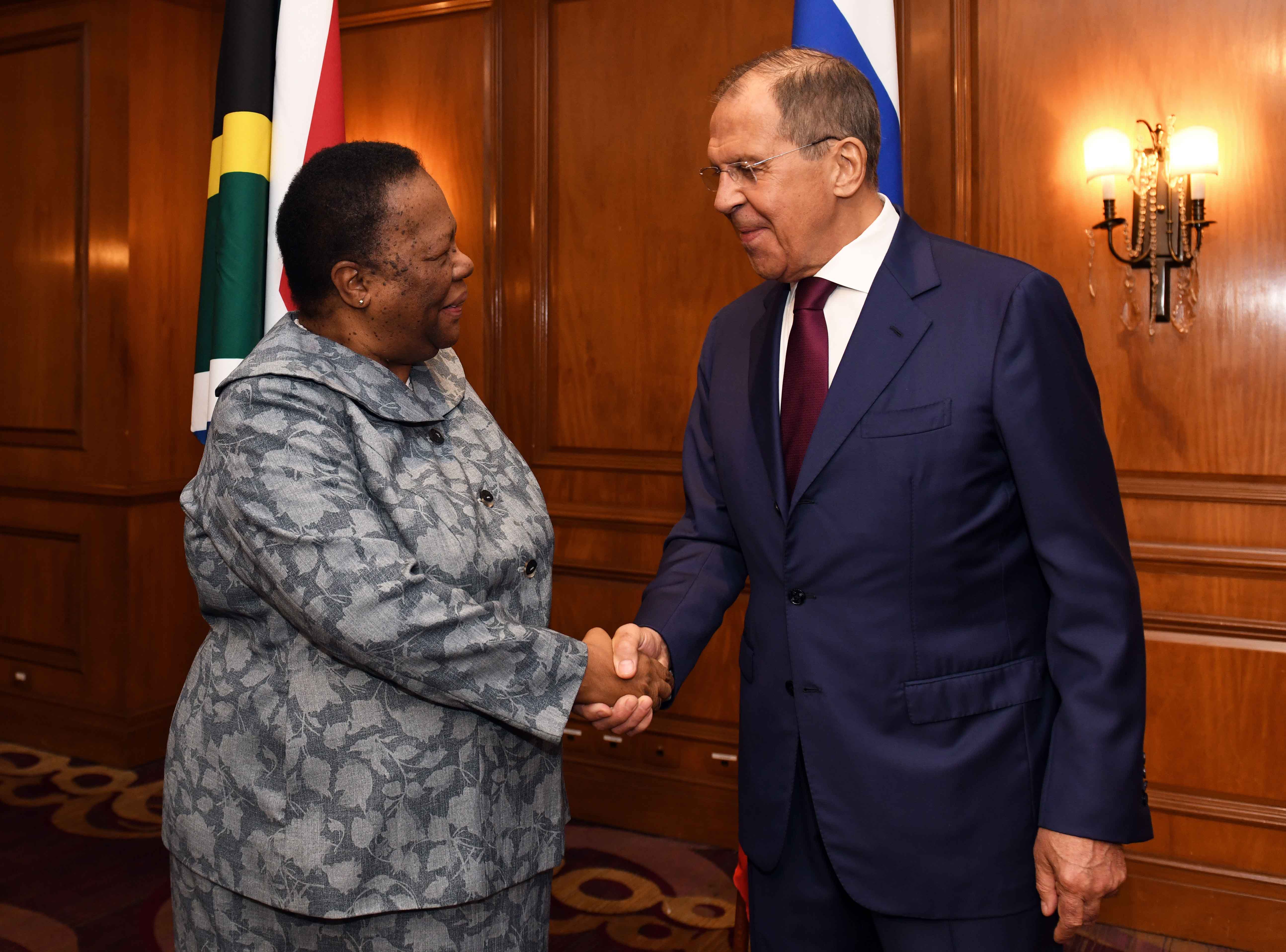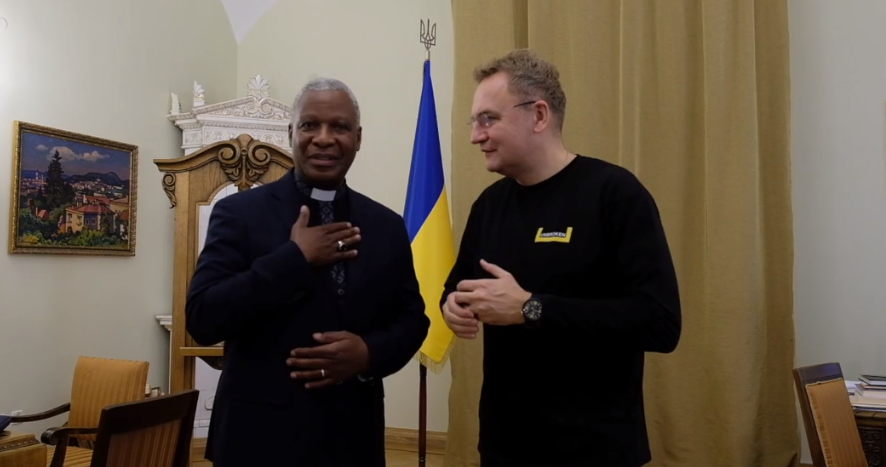News
Friendship or Fiendship? South Africa’s Weird Love for Russia Poses Serious Questions
Either the Russians have some kompromat on SA decision-makers; they’re paying them off; or SA decision-makers are incompetent and lacking any awareness of the objective of international relations and diplomacy. Or it could be a combination of the above. Even a pretence of neutrality — or non-alignment — has been firmly abandoned now in Russia’s favour by South Africa’s diplomatic mandarins led by Naledi Pandor, whose embarrassing public pledge of fealty to Lavrov must mark the low point for human rights in post-apartheid South Africa.

Former Director, The Brenthurst Foundation

Former Research Director, The Brenthurst Foundation

Fiendship. Noun. A relationship between two evil entities. Or between an evil entity and an utterly incompetent and morally bereft one.
The dogs have barked and Sergey Lavrov’s caravan has moved on to Russia’s next lapdog, but the question remains: Amidst all the fawning, flip-flopping statements, why exactly does the ANC government support Moscow in its invasion of Ukraine?
Leaving aside legal norms and niceties and questions of morality, as Tim Cohen has written on these pages, the US outscores Russia as a partner in every objective, commercial measure, from investment to trade.
It outscores Moscow in other aspects too, not least that the West is by far preferred as an emigration destination. South Africans, it turns out, do not share the ANC’s enthusiasm for autocrats like Russia and China. Having experienced the whip under apartheid, they value freedom, democracy and the quality of life in an open society.
Were it not for the Constitution, the ANC would long since have adopted the Russian model.
It has tried to hamstring the media with security legislation and “media tribunals” and has attempted to delegitimise opposition while capturing the state. All of these efforts have failed, thanks to the entrenchment of democracy and openness in the Constitution as the ANC’s support base has dwindled.
You would think that the ANC would by now realise that it faces an existential crisis as a result of its failings. Most recent polls show it dropping to around 40% in the 2024 election. Most ANC voters — almost three-quarters of them — believe that Russia’s invasion of Ukraine should be condemned.
But even a pretence of neutrality — or non-alignment — has been firmly abandoned now in Russia’s favour by South Africa’s diplomatic mandarins led by Naledi Pandor, whose embarrassing public pledge of fealty to Lavrov must mark the low point for human rights in post-apartheid South Africa.
Lavrov’s visit comes after the Simon’s Town naval base was the scene of late-night cargo movements on and off the Lady R, a Russian ammunition ship (now docked in Port Sudan, another fine holiday destination) and the announcement of joint Russian-Chinese-SA naval exercises off Durban next month.
Fake news playbook
Being hosted by Pretoria provides Russia with an opportunity to build its fake news playbook (“see, even democracies love us!”) and suits the Russians perfectly. Their new strategy across Africa appears to be to subjugate African nations using their Wagner mercenaries while extracting minerals worth billions for oligarchs. This is State Capture on a scale that even the ANC cannot compete with and must lust after.
Intelligence and media operations, platoons of bots and bags of diplomatic bluster are the weapons of choice as Russia tries to roll back the tide of democratisation in Africa.
The Africans who have been taken in by this new-found pal (a minority, sadly for the Russians, if UN voting is used as a measure) seem to forget that Lavrov’s love has not come about because the Russians suddenly have a change in attitude about Africa, but because Moscow’s relationship with the West has changed as a result of its military misadventure in Ukraine.
And South Africa’s failure to see this (or, to be kinder, to believe that a Ukrainian victory would pose a threat to its own options with the West), has all manner of implications, not least about the state of South Africa’s own security, both economic and military.
Take the upcoming naval exercise. What, pray, could the SA Navy learn from the Russians? Just as one would not expect the Boks to learn anything from playing Pakistan at rugby, the abject performance of the Russian military, their murderous philosophy, their appalling kit and their history of disasters, cockups and accidents are hardly the kind of thing SA would want to emulate.
So there must be another reason. Either the Russians have some kompromat on SA decision-makers; they’re paying them off; or SA decision-makers are incompetent and lacking any awareness of the objective of international relations and diplomacy. Or it could be a combination of the above.
As for the SA position that Russia is no longer obliged to withdraw from Ukraine, it is short-sighted in the extreme. Rules around sovereignty exist for a reason. There would be some unhappiness in the ANC, for instance, if the West failed to condemn an invasion of SA. As the German post-war chancellor Konrad Adenauer reminds: “An infallible method of conciliating a tiger is to allow oneself to be devoured by him.”
During Lavrov’s visit to SA, he was asked whether the high number of Ukrainian civilian casualties was the result of Russian military incompetence or a deliberate targeting of soft targets. Lavrov’s reply was predictably fake, referring to Ukraine’s use of civilian shields. How Pretoria can hold out its hand of friendship to a country that trades in callousness and doesn’t care about the law, democracy, and individual rights is as stunning as it is concerning.

Or should that be “fiendship”? Either way, the warmth of these relations will attach a premium of risk to everything South African, from investing in power stations to buying bonds.
News has just broken that Westinghouse Electric Company has lost its licence from the US Nuclear Regulatory Commission (NRC) to export fuel-assembly components to Eskom’s Koeberg plant near Cape Town, MyBroadband reported.
“Eskom is exploring the implications of the withdrawal of the US NRC approval for Westinghouse, and what is needed to enable them to continue supplying fuel,” the utility was quoted as saying.
Here’s an educated guess: Perhaps one of the things that is needed is not to break sanctions and help a global rogue power which is threatening nuclear war.
“When all else fails, there’s always delusion,” reminds Conan O’Brien. He was joking of course, as that’s his job, but Pretoria and Pandor appear to have taken this seriously.
The joke’s on them, but the cost is South Africa’s.
This article originally appeared on the Daily Maverick
Photo: Government ZA Flickr

